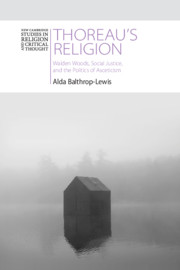Book contents
- Thoreau’s Religion
- Reviews
- Series page
- Thoreau’s Religion
- Copyright page
- Dedication
- Epigraph
- Contents
- Preface
- Acknowledgments
- Introduction: Why Thoreau Would Love Environmental Justice
- 1 Thoreau’s Social World
- 2 The Politics of Getting a Living
- 3 Thoreau’s Theological Critique of Philanthropy
- 4 Political Asceticism
- 5 Delight in True Goods
- Conclusion: The Promise of a Delighted Environmental Ethic
- Epilogue: On Mourning
- Bibliography
- Index
1 - Thoreau’s Social World
Published online by Cambridge University Press: 14 January 2021
- Thoreau’s Religion
- Reviews
- Series page
- Thoreau’s Religion
- Copyright page
- Dedication
- Epigraph
- Contents
- Preface
- Acknowledgments
- Introduction: Why Thoreau Would Love Environmental Justice
- 1 Thoreau’s Social World
- 2 The Politics of Getting a Living
- 3 Thoreau’s Theological Critique of Philanthropy
- 4 Political Asceticism
- 5 Delight in True Goods
- Conclusion: The Promise of a Delighted Environmental Ethic
- Epilogue: On Mourning
- Bibliography
- Index
Summary
One of the most popularly salient images of Thoreau taken from Walden is Thoreau as an asocial hermit, whether an honest one or a hypocrite. The Honest Hermit view sees his time in the woods as a praiseworthy retreat from other people in pursuit of higher values among nature. The Hypocrite Hermit view takes his forays into town – and the assumption that his mother did his laundry especially – as a sign that while he aimed to look holy out there in his hermitage, and would have been holy if he had achieved what he claimed, he did not live up to his own standard.
- Type
- Chapter
- Information
- Thoreau's ReligionWalden Woods, Social Justice, and the Politics of Asceticism, pp. 40 - 87Publisher: Cambridge University PressPrint publication year: 2021

